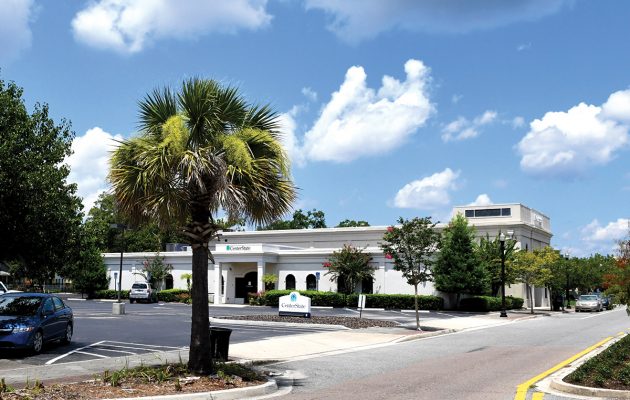Historic Preservation Commission approves CenterState Bank demolition
Posted on August 1, 2018 By Editor Articles, Neighborhood News, Top Stories

A familiar sight in the heart of the Park and King retail corridor could be razed for a mixed-use development as the Jacksonville Historic Planning Commission approved a request for demolition at its July 25 meeting. But that action won’t occur for at least 18 to 24 months, according to Bryan Hunter, CenterState Bank director of corporate real estate.
The 66-year-old CenterState Bank building, which sits on nearly three acres on King Street, with frontage on Forbes, Lydia and Downing Streets and Frederica Place, was originally the home for First Guaranty Bank & Trust, at one time Riverside’s oldest operating bank.
The application for Certificate of Appropriateness (COA) submitted to the City of Jacksonville June 25, 2018, indicates CenterState Bank management has determined the size of the building is overwhelming and inefficient for current staff, noting a large portion of the building is unused.
Hunter said only about 3,000 to 4,000 square feet is needed to operate, instead of the building’s almost 17,000 square feet on the ground floor, plus another 7,000 square feet or more in the upper story.
The COA, submitted by Hunter and Mark Shelton of Kimley-Horn and Associates, Inc., stated the proposed used of the property would be “a mixed-use development with commercial and multi-family residential.”
Hunter said CenterState Bank will operate a branch on the parcel but didn’t know at this time whether it would be an independent structure or part of the commercial use of the project. He said there would be a new structure built somewhere in the vicinity before the financial institution would even consider demolishing the current bank building, and that could be 18 to 24 months out. “We won’t demolish the building until after we have moved into a new office,” said Hunter. “There will be no disruption in service. Unfortunately, the [COA] application planted a seed in everyone’s mind.”
The potential buyer of the property is J.B. Ritz, a Jacksonville Beach developer, associated with Joseph Eckstein of Eckstein Investments and other companies. Under AC Packer LLC, Eckstein developed The Loree, a 16-building apartment complex on A.C. Skinner Parkway in the Baymeadows area.
This recent application wasn’t the first time, however, that the idea of demolition and redevelopment was floated. Nancy Powell, Riverside Avondale Preservation board chair, said they met with the bank’s Executive Vice President Gil Pomar and a developer’s representative more than a year ago to review preliminary plans. At that time, Powell said, the plans were not well-designed or pedestrian-friendly. Pomar then indicated he was not sure they would move forward, and the project was dropped, according to Powell. Pomar is now the EVP/Regional President of South Florida Region for the bank, making that transition in December 2017.
The property is listed with a market value of $2,521,600, on the Property Appraiser’s website and was purchased by CenterState Bank for $2,230,000 on Jan. 27, 2012, the same day First Guaranty was closed by the Florida Office of Financial Regulation due to “a troubled asset ratio of 522%,” the highest bad loan ratio of all Jacksonville-based banks in 2010.
The Property Appraiser’s site also indicates the structure was built in 1922, which would deem it a “Contributing Structure” in the historic district, however, that is incorrect. Documentation with the COA notes the building was erected in 1952, when First Guaranty relocated from its first office on Park Street. Renovations were made five times in subsequent years, including a one-story addition and two-story mezzanine in 1955, drive-thru tellers in 1961-62, brick veneer in 1971, a canopy in 1974, and replacement of all windows with storefront aluminum windows in 1984.
The application also states, “The demolition of this structure to make room for a new mixed-use development will provide a more efficient use of this infill parcel as well as a drastic increase in the tax-base.”
RAP’s concern is to make sure the demolition doesn’t happen before the project’s plans are made available for public comment, risking the result of a vacant property should the plans not be approved, according to Powell.
The COA was approved with the conditional agreement that demolition may not begin until the applicant or owner has secured final approval of a new construction COA and a Planned Unit Development (PUD).
By Kate A. Hallock
Resident Community News




 (No Ratings Yet)
(No Ratings Yet)





